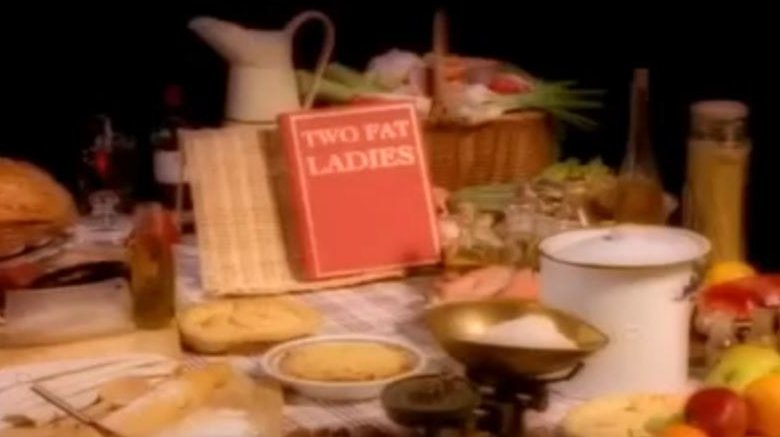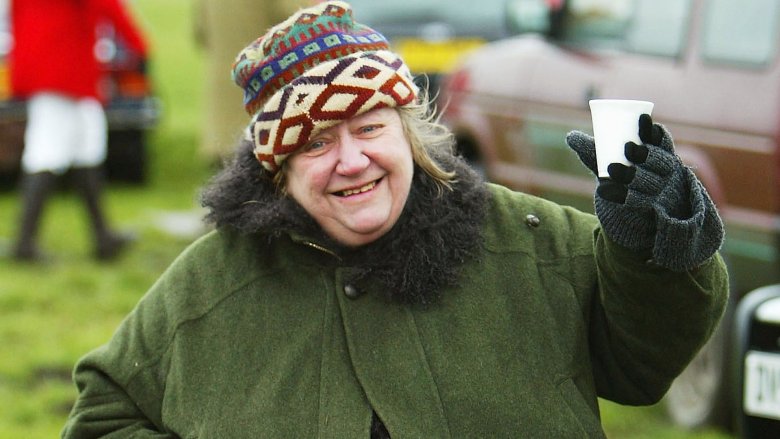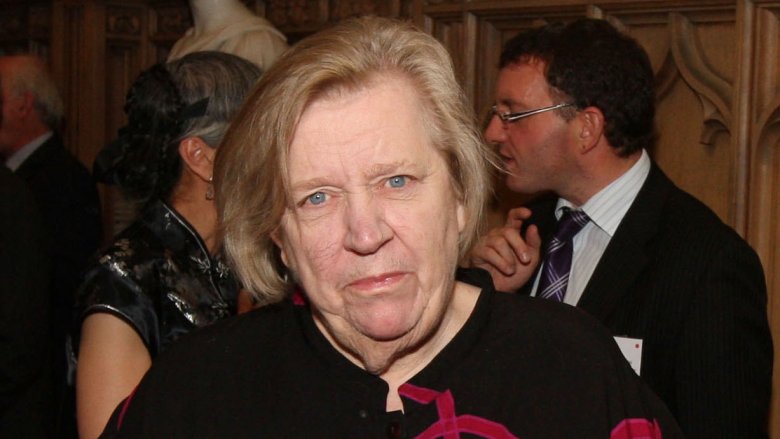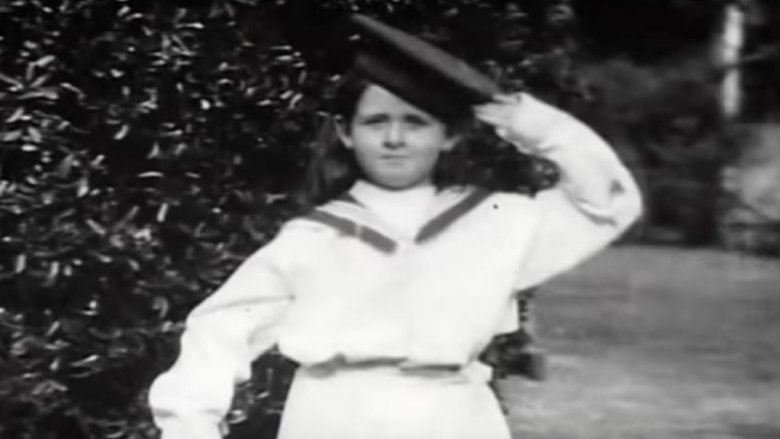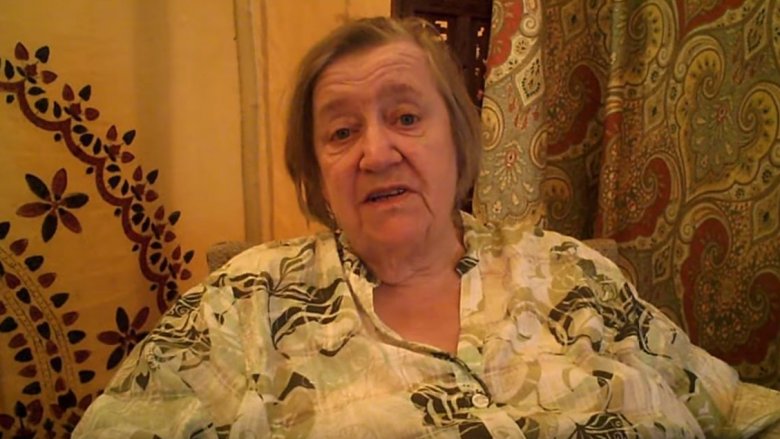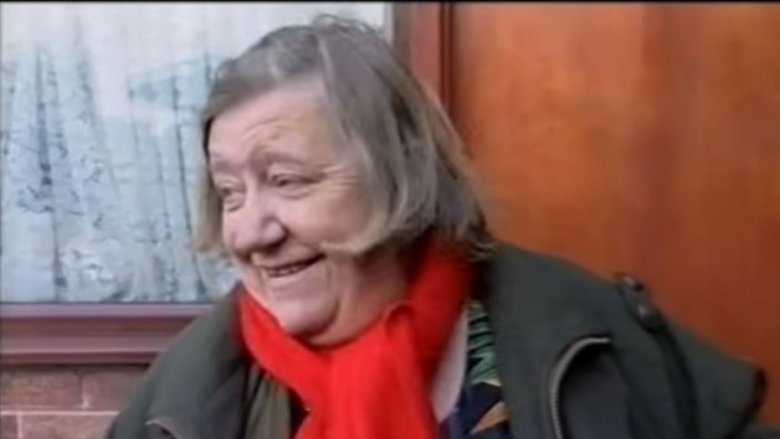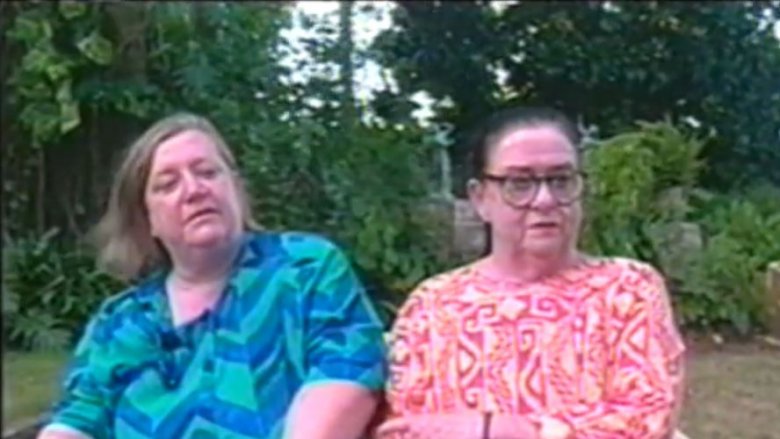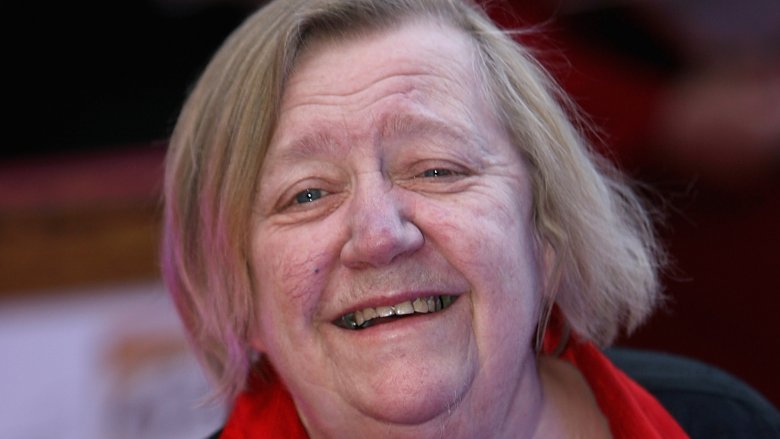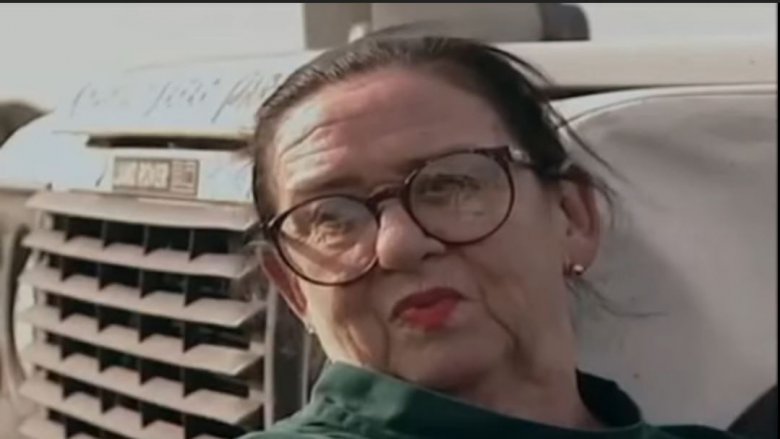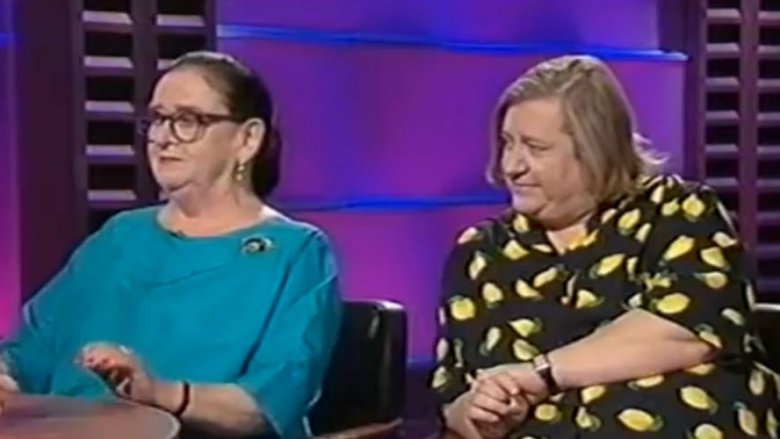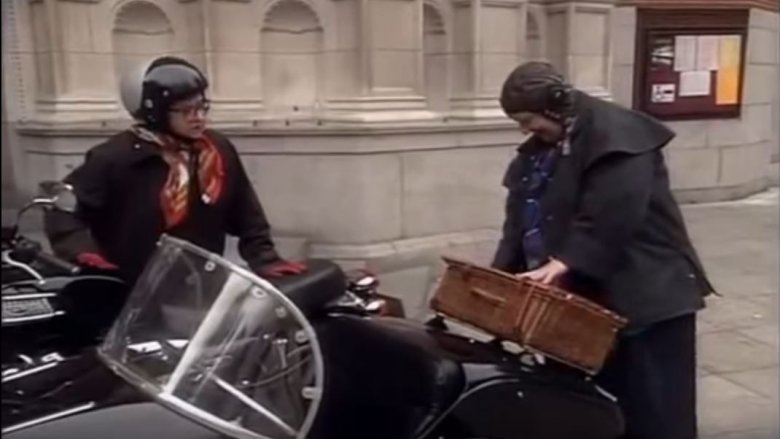The Untold Truth Of Two Fat Ladies
The iconic show Two Fat Ladies introduced British cooking to international audiences when it first aired in the late 1990s. The unlikely hit featured two heavyset, aging ladies who delighted viewers with their disdain for healthy food and their politically incorrect banter. The BBC sensation caught on across the pond where it aired on The Food Network, securing the beloved show's legacy all over the world. While fans will be familiar with the on-screen antics of Clarissa Dickson Wright and Jennifer Paterson, their off-screen personalities were even more fascinating.
Dickson Wright's childhood was troubled
Coming from a privileged, but troubled, childhood had a huge impact on Dickson Wright. Her father, a surgeon, was an alcoholic whose temper would sometimes lead to violence. "I don't love him, no," she told The Guardian. "There was nothing there to love — there was no emotional link. I didn't have conversations with him, we merely exchanged knowledge."
"I had to get past the violence and the drunkenness and abuse before I could see that I had various things to be thankful for," she said.
Dickson Wright had a hot temper
Dickson Wright was known for being fierce both on screen and off. Patricia Llewellyn, producer of Two Fat Ladies, spoke about Dickson Wright's temper after her death. "We called her 'Krakatoa' because if you didn't notice the rumbling you could find yourself in trouble," she said. "She was a force of nature." Her attitude paired well with Paterson, who was also known for being a strong presence.
Paterson was once expelled from boarding school
Like her co-star, Paterson came from a privileged background. Something of a troublemaker in her childhood, she was once expelled from school for being "disruptive." According to Paterson, the nuns at her Catholic boarding school "had to expel me in the end. They claimed it was the only way to get the rest of the school to settle down."
Her feisty attitude would continue into adulthood. After her death, BBC broadcast chief executive Will Wyatt said, "Jennifer was a life force on the side of all things that were politically incorrect."
Dickson Wright was a legal prodigy before turning to cooking
Dickson Wright didn't enter the cooking scene until later in life. Her first career was in law, and at the age of 21 she became the youngest woman ever to be called to the Bar. It was her father's refusal to pay for his daughter's education that spurred Dickson Wright. "I hated my father so much: he wouldn't pay for me to go to university and then do bar exams; so I did six years' work in three," she told Church Times. "Yes, I was clever and determined. He would only pay for me to study medicine. Think how many people I would have killed."
Dickson Wright was an alcoholic
Like her father, Dickson Wright battled alcoholism. Her heavy drinking forced her to abandon her law career and also led her to squander the millions she inherited from her parents. While she eventually sought treatment and remained sober in her later years, the damage caused by her drinking was irreparable. A gin and tonic aficionado, the quinine in the tonic water permanently damaged Dickson Wright's adrenal gland which caused her to struggle with her weight.
They hated vegetarians
Dickson Wright and Paterson were vehemently opposed to a vegetarian lifestyle. "Vegetarians are fascists," said Dickson Wright. "I'd fight to the death for their right to be vegetarian, but they won't return the compliment. I hate fascism in any guise."
Paterson claimed that a vegetarian diet leads to malnutrition. "Why are [vegetarians] always so cross?," she said. "It's because they eat the wrong things. They look terrible; they're usually of a yellow colour. You go to a health shop and they all look so depressed. They need cheering up, poor dears."
Paterson was also horrified at the increasing number of vegetarians as she grew older, comparing them to Nazis. "There were few around in my young days," she said, "and those we did come across we considered to be German spies. After all, Hitler was a veggie."
They were notoriously opposed to political correctness
Paterson and Dickson Wright were infamous for saying whatever came across their minds. Political correctness had no place on their show. When asked if she objected to being called fat in the show's title, Dickson Wright said "If you're fat you're fat. I hate this modern-day political correctness, that you don't call things by their proper name."
Dickson Wright was new to cooking when the show first aired
Before becoming the star of Two Fat Ladies, Dickson Wright had no training in the kitchen. While she did work in the food business, her experience was limited to running cookbook stores and running her catering business. It wasn't until she teamed up with Paterson, a seasoned chef with significantly more experience, that Dickson Wright learned to cook. She said that before then, she had never had so much as a single cooking lesson.
Paterson was self-taught
While Paterson was the more experienced of the pair, she was self-taught. Even more interesting is the fact that neither of her parents knew how to cook — according to Paterson, "her father couldn't boil a kettle." But Paterson didn't let this stop her. She believed that cooking was a talent and to learn how to use it. "All you need is a deep interest in your subject," she said.
Paterson certainly had a deep interest. "I was always hovering about the kitchen, bothering cook and making horrible little pies," she said. She nurtured her talent for cooking and later become a private cook and a food columnist
The pair got along from the beginning
The now iconic duo seemed like old friends when the first episode aired, but in reality they barely knew each other. They were brought together by producer Pat Llewellyn who met Jennifer Paterson at a lunch party and conceived the idea for Two Fat Ladies after seeing her drive off on a motorbike. Llewellyn brought Paterson and Dickson Wright together and the rest is history.
"I think they thought we'd fight," Dickson Wright later said. "Aren't two opinionated women the Chinese symbol for war? But we got on like a house on fire, and I think the sheer anarchy of that was why the series was so successful."
But they may not have liked each other
Despite Dickson Wright's claims that she and Paterson were fast friends, rumors swirled that the pair actually hated each other. According to Ian Scott, a PR executive who knew both women, they were "not friends." He claimed that during filming, the women would have to be booked into different hotels because they hated each other so much. "Jennifer in particular couldn't stand Clarissa and was often quite horrible about her," he said. "She'd call her 'that dreadful woman.'"
Scott said that most of the animosity was from Paterson's end and that she had a cruel side. "They clashed, simple as that," he said. "They were both such strong characters: loud, clever. I think it was clear that Clarissa was intellectually Jennifer's superior."
They used to get death threats
Dickson Wright and Paterson may have starred on a beloved show, but many people were not thrilled with their bluntness. After Paterson's death, Dickson Wright was left to face the vitriol of their critics alone. Dickson Wright remembered one person yelling "One dead Fat Lady, one to go."
"It was the most awful thing because it wasn't long after Jennifer died," she said. "I usually pay no attention to the bloody antis because they are so awful, but I thought that was plain vicious. Clearly they are sick people."
Dickson Wright made it clear that, in spite of a growing number of death threats, she could protect herself. "I once had two people attempt to mug me and they both ended up in intensive care," she said. "I can handle myself. The reason one doesn't retaliate is that one doesn't want to stoop to their level."
They were parodied in an SNL sketch
The show became so well known that it was even memorialized in a Saturday Night Live sketch in 1999. Brendan Fraser played Paterson and Darrell Hammond portrayed Dickson Wright. The sketch parodied the ladies' distaste for healthy foods, showing them "improving" healthy meals by adding pork rinds, butter, and mayonnaise to salad.
